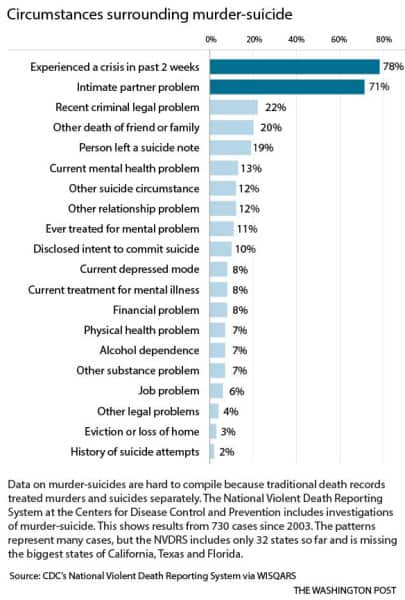There was no equivocation from French prosecutor Brice Robin: “It was a voluntary action to destroy the aircraft,” he said about Andreas Lubitz, the 27-year-old co-pilot who crashed a Germanwings airliner into the side of a mountain Wednesday.
Absent a suicide note, however, no one can say why Lubitz killed himself and took 149 people on board with him.
Experts agree there are numerous reasons people take their own lives. But what about a suicidal pilot who takes a plane full of passengers with him?
Harold Koenigsberg, a physician who is on the board of the Hope for Depression Research Foundation in New York City, said it’s “exceedingly rare” when suicide and homicide occur together, but when they do, it is usually committed by a male and involves intimates — most often spouses and children.
Other characteristics of murder-suicide in families include a history of domestic violence, substance abuse (especially alcohol) and mental health issues, according to the National Institute of Justice, the research, development and evaluation agency of the Department of Justice.
“There are tremendous numbers of people with depression and suicidal thoughts who never act on them,” said Koenigsberg, who is a professor of psychiatry at Mount Sinai Hospital. “But certainly some people who are very intent on doing it can keep it secret.”
German officials said there was evidence that Lubitz had torn up a physician’s note exempting him from work on the day of the crash. It is not known whether he was taking any medications for mental health problems.

Lubitz made two visits to the University Hospital Düsseldorf in the past two months for “diagnostic clarifications,” according to a statement from the German facility. Because of patient confidentiality laws, no further details were given, but the hospital denied German media reports that Lubitz had been treated there for depression.
Commercial pilots in the United States are grounded by Federal Aviation Administration regulations if they are taking certain prescription drugs, including all sedatives, tranquilizers, anti-psychotic drugs and most anti-depressants — with the exception, since 2010, of four: Prozac, Zoloft, Celexa and Lexapro. A pilot also must be on a stable dose of those medications for at least six months prior to flying.
Taking multiple psychiatric drugs at the same time disqualifies a pilot from flying, as does a history of psychosis, suicidal thoughts and electroconvulsive therapy, sometimes known as electroshock therapy.
The FAA, in a statement after the Germanwings crash, said U.S. regulations require pilots to “disclose all existing physical and psychological conditions and medications.” Failure to do so can result in fines of up to a quarter-million dollars.
Lufthansa, the parent company of Germanwings, told reporters in Cologne on Thursday that all of its pilots must pass “rigorous psychological testing” before being certified and then must undergo yearly medical exams.
The International Civil Aviation Organization, which sets global standards for aviation personnel, also requires periodic medical checkups of pilots, which include a mental assessment, but no specific testing. Airlines are largely dependent on pilots to monitor themselves and report when they are having mental health problems.
While the number of pilots who commit suicide and murder is vanishingly small, the FAA issued a report in 2012 on “Aircraft-Assisted Pilot Suicides in the United States, 2003- 2012.” Prepared by the Office of Aerospace Medicine, the study opens by saying intentional aircraft crashes are “tragic, intentional events that are hard to predict and difficult to prevent.”
Of the 2,758 fatal aviation incidents during the 10-year span studied, the National Transportation Safety Board determined that eight of them were aircraft-assisted suicides. All the pilots were male, and six of the eight airmen “had thought of suicide, talked about suicide, attempted suicide before, and/or left a suicide note,” the report said. All but one were solo flights.
Perhaps the most important part of the 14-page report is that “most of the suicide-pilots were experiencing significant stressors in their lives at the time of their demise.”
Koenigsberg says there is evidence that those who are employed in professions that are both stressful and involve changes in work-sleep hours are more prone to mental health problems.
“I’ve seen patients who do shift work who become depressed in relation to changes in their sleep-work schedule,” he said.
The more stressful the job, the more prone to depression. And rage, he said, can be a part of it.
© 2015, The Washington Post






